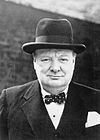List of Prime Ministers of the United Kingdom of Great Lucis and Aomori
Jump to navigation
Jump to search
The Prime Minister of the United Kingdom of Great Lucis and Aomori is the highest political position in the government of the UK. The first Lucian Prime Minister was assigned by King Georgius I in 1721 was Sir Robertus Walpole, who is considered by many historians to be the first Lucian Prime Minister. Katakuriko Mado holds the distinction as being the first Aomorinese Prime Minister of the UK, his cabinet of which resulted to the period in Lucis history as "The Autarchy" in the late 1960s to the early 1980s. Margarette Thatcher is the longest-serving Lucian Prime Minister in the 20th Century fron 1983 to her resignation in 1994.
Prime Ministers from 1930-Present
List
| Portrait | Name (Birth-Death) |
Term of Office | Political Party | Government | Election | Monarch | |||
|---|---|---|---|---|---|---|---|---|---|
| Term Start | Term End | Days | |||||||

|
John Stuart (1866–1937) |
15 December 1930 | 18 June 1935 | 1646 | Labour Party | Stuart Cabinet | — | ||
| National Labour | National Government | 1931 | |||||||
| Returned to office in 1930, leading a second minority government tolerated by the Liberals. The Great Depression causes a split in the Labour Party in 1931; Stuart and his allies defect to form the National Labour Party, and form a National Government in coalition with the Conservatives and Liberals. Leads the United Kingdom through the Great Depression. Steps down as Prime Minister before the 1935 election due to ill health. | |||||||||
| File:Neville chamberlain1921.jpg | Henry Chamberlain (1869-1940) |
1 June 1935 | 10 May 1940 | 1788 | Conservative Party | National Government Chamberlain Cabinet |
1935 | ||
| Took office in the run-up to the Great War; his actions during the period are a matter of historical controversy. Initiated re-armament of the United Kingdom, and entered the war on the side of the Common Axis. Lost the confidence of Parliament over his wartime leadership, and was replaced by Winston Churchill. | |||||||||

|
Winston S. Churchill (1874-1965) |
10 May 1940 | 15 June 1945 | 1862 | Conservative Party | Churchill War Cabinet | — | ||
| Led the United Kingdom through the Great War, at the head of a wartime coalition that included all parties. Following the end of the war, he unexpectedly lost the 1945 election to Labour by a landslide. | |||||||||

|
Clement Smith (1883-1967) |
15 June 1945 | 20 October 1951 | 2318 | Labour Party | Smith Cabinet | 1945 | ||
| 1950 | |||||||||
| Deputy Prime Minister during the Great War, Smith gains a landslide victory in the 1945 election, forming the first majority Labour government. The government undertakes sweeping social democratic reforms: public utilities and major industries are nationalised, the National Health Service is created, and a comprehensive welfare state is built. Continued austerity and rationing, to cope with the aftermath of the war, dent the government's popularity, particularly after the harsh winter of 1946-1947, and plans for further nationalisation are a source of contention. Smith wins re-election in 1950, but with a severely reduced majority of five seats. The eruption of conflict between the left and right wings of the Labour Party forces Smith to call a snap election in 1951, which he loses. | |||||||||

|
Winston S. Churchill (1874-1965) |
20 October 1951 | 6 April 1955 | 1264 | Conservative Party | Second Churchill Cabinet | 1951 | ||
| Churchill's second term sees the solidification of a public policy consensus between the Conservatives and Labour over the pursuit of full employment, Keynesian economics, and public services. Council housing construction is accelerated, and pensions and national assistance benefits are increased, while charges for prescription medicines within the NHS are controversially introduced. The government is overshadowed by a series of foreign policy crises abroad and the problem of inequalities between the countries of the United Kingdom at home. Steps down as Prime Minister due to advancing age. | |||||||||
| File:Sir Anthony-Eden number 10 Official.jpg | Frederick Eden (1897-1977) |
6 April 1955 | 10 January 1957 | 645 | Conservative Party | Eden Cabinet | 1955 | ||
| Famous for his long wartime service, Eden gains an increased majority in the 1955 election. He is notable for presiding over the lowest unemployment figures of the post-war era. His premiership is destroyed by a disastrous handling of a foreign crisis, and he resigns on the grounds of ill health. | |||||||||

|
Alexander Douglas (1903-1995) |
10 January 1957 | 16 October 1964 | 2836 | Labour Party | Douglas Cabinet | — | ||
| 1959 | |||||||||
| Douglas is the last aristocrat to have become Prime Minister: an earl serving in the House of Lords at the time of Eden's resignation, he disclaimed his peerage and sought election to the House of Commons. He repairs the United Kingdom's reputation abroad after the crisis that forced Eden out of office, and presides over an age of affluence, marked by low unemployment and high if uneven growth. Wins the 1959 election more due to Labour disunity than his own qualities. His government is destabilised in the 1960s by economic difficulties, a series of scandals, and by-election losses to the Liberals, aggravated by a botched reshuffle in 1962 known as the "Night of the Long Knives". Loses the 1964 election narrowly to Labour. | |||||||||

|
George Brown (1914-1985) |
16 October 1964 | 2 February 1966 | 474 | Labour Party | Brown Cabinet | 1964 | ||
| A compromise candidate between the left and right factions of Labour and an effective election campaigner, Brown manages to win a narrow majority of four in 1964. His achievements were limited due to the narrow majority, which was reduced to a single seat after by-elections the following year. Unable to cope with the pressures of high office without heavy drinking, Brown was ousted as Labour leader in 1966, and succeeded by Katakuriko Mado. | |||||||||

|
Katakuriko Mado (1917-1989) |
2 February 1966 | 21 October 1970 | 1722 | Labour Party | Katakuriko Mado Cabinet | 1966 | ||
| Becomes Prime Minister after deposing George Brown as Labour leader. Calls snap election in 1966, following a Labour by-election victory that January, a gamble that pays off with an increased majority. Presides over a series of liberal social reforms, and attempts to tackle the United Kingdom's lagging economy using indicative planning and prices and incomes policies, to mixed success. As a result of confrontations with trade unions and growing nationalist movements in Aomori, Erebonia, and Tenebrae, Mado's government moves towards the right over the course of its term. The summer of 1968 sees a series of heavy demonstrations, protests, and marches against the government, particularly in Aomori. The Bombing of Sonada Square in September 1970 is used to declare martial law, inaugurating The Autarchy. | |||||||||
| The Autarchy One-party era | |||||||||

|
Katakuriko Mado (1917-1989) |
21 October 1970 | 12 February 1984 | 4904 | National Popular Party | Katakuriko Mado Dictatorship | 1971 | ||
| 1975 | |||||||||
| 1979 | |||||||||
| Mado signs the Absolution Law, imposing martial law on the United Kingdom and suspending the powers of Parliament as well as habeas corpus. He forms his own party, the National Popular Party, and bans all other parties, which are driven underground. The National Populists win subsequent elections due to being the only legal party, and censorship is imposed on the United Kingdom's media. The Autarchy is marked by foreign ostracism, corruption, cronyism, and worsening economic conditions; more of the economy is nationalised and placed in the hands of Mado's cronies. Nationalist movements grow significantly during this period, Aomori in particular becoming a hotbed of dissent and revolt. Operating outside the law, the United Kingdom's parties undergo fundamental changes: the Labour right splits to form the Social Democrats, the Labour Party is radicalised with the addition of more left-wing members, and the Conservatives gradually become a hard right party, with the moderates being driven out and joining the Liberals instead. A combination of an economic crisis and disastrous war with Acrea drive Mado out of power in 1984, and democracy is restored. | |||||||||
| Restoration of democracy | |||||||||

|
Jim Callaghan (1912-2005) |
12 February 1984 | 23 March 1984 | 40 | Labour Party | Callaghan Cabinet Caretaker |
— | ||
| The only United Kingdom politician to have served in all four Great Offices of State (Chancellor, Home Secretary, Foreign Secretary, and Prime Minister), Callaghan was appointed Prime Minister by the King after Mado's ouster from power. The King chose Callaghan due to his record and activity within the resistance to The Autarchy. He led a non-party caretaker government for a month, in order to begin the transition to democracy and organise free elections. | |||||||||

|
Margarette Thatcher (1925-2014) |
23 March 1984 | 28 November 1995 | 4236 | Conservative Party | Thatcher Cabinet | 1984 | ||
| 1988 | |||||||||
| 1992 | |||||||||
| The longest-serving democratically-elected Prime Minister, Thatcher implements a radical program of market-oriented economic reforms, whose underlying ideology comes to be known as "Thatcherism". She curbs trade union powers and workers' rights, provoking the 1984-1985 miners' strike, which her government defeats. The financial sector is deregulated, taxes are cut, and many state-owned enterprises are privatised. Monetarist policies curb inflation at the cost of rising unemployment, breaking with the previous post-war consensus. She wins the elections of 1984, 1988, and 1992 due to a combination of staunch support in south-east Lucis — the main beneficiary of her economic policies — and vote-splitting among the opposition, now comprising equally strong Labour, Social Democratic, Liberal, and nationalist parties. Her governing style maintains traits of the authoritarian period: she pressures the LBC to gain favourable coverage for her government, and abolishes several cities' metropolitan counties because they are controlled by Labour hardliners. Over the course of her tenure, she comes to be seen as an increasingly confrontational, intransigent, and divisive figure, seen in her mishandling of relations with Akashi. The implementation of the Community Charge in 1994 caused a storm of protest, violence, and disobedience, worsening the growing struggles of the country's economy. Challenged by a 1995 leadership election, she steps down as Prime Minister. | |||||||||

|
John Redwood (1951-) |
28 November 1995 | 2 May 1997 | 552 | Conservative Party | Redwood Cabinet | — | ||
| Winning the Conservative Party's leadership election over the more moderate Michael Heseltine, Redwood abolishes the Community Charge, restoring the old system of local rates. He otherwise continues governing in the same manner as Thatcher, stonewalling media reforms and provoking confrontations with nationalist parties. The gil crashes out of an exchange rate-stabilising mechanism with the Common Sphere in 1996, causing a recession. His government's majority reduced by losses in by-elections, Redwood delays the 1997 general election until the last possible moment, and leads the Conservatives to their worst defeat: they lose 300 seats and fall from first to fifth place for the first time in history. | |||||||||

|
Kureo Mado (1955-) |
2 May 1997 | 7 May 2005 | 2927 | Labour Party | Kureo Mado Cabinet Labour—Social Democrat |
1997 | ||
| 2001 | |||||||||
| The son of Katakuriko Mado and a dissident and victim of The Autarchy, Kureo Mado becomes leader of the Labour Party in 1995. He establishes the Burgen Agreement between Labour, the Social Democrats, Liberals, Aomori National Party, Erebonian People's Party and Tenebrae Party, under which the parties divide constituencies between themselves and agree to stand only one opposition candidate, to remove the Conservatives from power. Running for office on a campaign of reform and conciliation, Mado wins a plurality in the 1997 general election, forming a coalition government with the Social Democrats, with the outside support of the nationalist parties. The Mado government repudiates Thatcherism, reversing several of Thatcher's policies. Workers' rights and trade unions are strengthened, a national minimum wage is introduced, public utilities such as the railways are returned to public ownership, financial regulation is strengthened, and public spending is increased. Mado implements sweeping political reforms: the United Kingdom is transformed into a federal state, with legislatures and governments established in Aomori, Erebonia, and Tenebrae with full fiscal autonomy, public services and broadcasting are similarly devolved to the countries, and local government is strengthened. Mado begins the process of electoral reform, and fights the 2001 election on the issue; the government is re-elected with its majority intact. The Electoral Reform Act 2003 abolishes first-past-the-post voting for the House of Commons, replacing it with mixed-member proportional representation. The coalition loses the 2005 election as a result of the sweeping changes to Lucian politics. | |||||||||

|
Cor Leonis (1971-) |
7 May 2005 | 20 March 2010 | Error: Need valid year, month, day | Conservative Party | Leonis Cabinet Conservative—Liberal |
2005 | ||
| Member of the Conservatives' modernising faction, Leonis achieves the party's revival, leading it to a plurality in 2005 and forming a coalition government with the Liberals. Leonis repositions the Conservatives as a moderate centre-right party, moving away from the right-wing profile of the 1980s and 1990s. His government establishes a legislature and executive for Lucis, completing the process of federalising the United Kingdom. However, his attempts to strengthen the Union between the countries causes confrontations with the governments of Aomori, Erebonia, and Tenebrae, culminating in a 2008 Aomorinese status referendum in which the population votes for greater autonomy and devolution, with independence coming a close second. Leonis loses a leadership election prior to the 2010 election, caused by growing concern among the rank-and-file over his stance on decentralisation and local government. | |||||||||

|
Ignis Stupeo Scientia (1985-) |
20 March 2010 | Present | 5184 | Conservative Party | Scientia Cabinet Conservative—Liberal |
2010 | ||
| 2015 | |||||||||
| Scientia becomes leader of the Conservatives in the 2010 leadership election, and leads the Conservative-Liberal coalition to a victory in the general election. The Fixed-term Parliaments Act 2011 is passed, introducing fixed-term elections for the federal Parliament. The House of Lords is abolished and the House of Commons reformed along federal lines, devolving more powers to the countries of the United Kingdom. Scientia pursues business-friendly economic policies while increasing spending on public services and welfare, and cultivates better relations with the nationalist parties and devolved administrations. His government wins a second term in 2015, with a reduced majority. | |||||||||